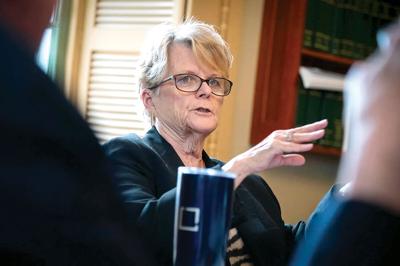Gov. Phil Scott on Feb. 22 signed into law H.850, a bill that repeals a controversial property tax cap and allows school boards to push back budget votes to lower education spending and, in turn, property taxes.
“The changes made in this bill are a necessary step as Vermonters face a projected 20 percent increase in property tax bills, and in some communities, it could be even higher,” Scott wrote in a letter to lawmakers. “But to be clear, this bill does not solve our property tax problem. These changes will only reduce rates if school boards adjust their budgets accordingly and local voters support those changes.”
The Senate expedited passage of the bill, which it sent to the governor on Feb. 21.
Lawmakers called the “time-sensitive” bill, H.850, a “Band-Aid” in addressing property taxes. But in a spirited floor session last week, many acknowledged the changes wouldn’t be enough.
Senate President Pro Tempore Phil Baruth, D/P-Chittenden Central, said the Legislature would need to come up with “groundbreaking” new ways to contain public education costs this year.
H.850 would repeal the 5 percent homestead tax rate increase cap created by Act 127 — Vermont’s most recent education funding law — and replace it with a tax discount system limited to districts that lost taxing capacity under the new pupil weighting system created by the law. The bill also would allow school districts to alter their budgets as lawmakers hope removing the property tax cap would spur school boards to remove spending, thus lowering property taxes.
School district leaders say the spending increases are needed to maintain the status quo due to inflation, rising staff health care costs and teacher salaries and the increased needs of Vermont’s children, an increasing number of whom are struggling with mental health challenges.
Compared to other U.S. states, Vermont ranks at or near the top in terms of public education spending per student and student-to-staff ratios.
Earlier this year, legislators grew concerned that Act 127’s tax increase cap was encouraging districts to add extra money to their budgets, calling it an “unintended consequence.”
Scott’s finger-pointing at lawmakers has become a repeated refrain as Vermonters face a projected average property tax increase of 20 percent, driven by a predicted 15 percent increase in education spending.
The law will also allow school districts to push back budget votes until April 15, as lawmakers hope removing the property tax cap will spur school boards to remove spending. Many districts had planned to put budgets in front of voters on Vermont’s Town Meeting Day, which this year is March 5.
It remains to be seen how much money districts might take out of their proposed budgets with H.850’s prompting. Lawmakers in both chambers have also signaled they will consider increasing revenue sources to the education fund, which would also reduce property taxes.
Future cost containment measures were actively discussed on Tuesday in the Senate Committee on Finance, as Sen. Ann Cummings, D-Washington, and Sen. Thomas Chittenden, D-Chittenden Southeast, mulled ideas like capping spending or increasing the staff-to-student ratio in schools.
Senators homed in on the complexity of Vermont’s education finance system, which some suggested required systemic reform in order to simplify.
Sen. Randy Brock, R-Franklin, advocated for bringing back a tax commission that could study Vermont’s taxes as a whole, thinking about potential changes holistically rather than piecemeal.
He called Vermont’s current tax system “convoluted” and “difficult to understand,” noting that even senators struggle to explain the workings of education finance.
Like Brock, Sen. Russ Ingalls, R-Essex, the only vocal opponent to H.850, called for simplicity.
Act 127 “was really well thought out,” Ingalls said, yet the Legislature “failed so miserably” and “caused so much confusion” that it hadn’t anticipated.
“I can’t go home and tell everybody what we did, what we didn’t do,” Ingalls said, citing the opaqueness of the funding system. “I just think that we need to be better.”
This story, by Ethan Weinstein, was first published by VTDigger on Feb. 22.

















(0) comments
Welcome to the discussion.
Log In
Keep it clean. Please avoid obscene, vulgar, lewd, racist or sexual language.
PLEASE TURN OFF YOUR CAPS LOCK.
Don't threaten. Threats of harming another person will not be tolerated.
Be truthful. Don't knowingly lie about anyone or anything.
Be nice. No racism, sexism or any sort of -ism that is degrading to another person.
Be proactive. Use the "Report" link on each comment to let us know of abusive posts.
Share with us. We'd love to hear eyewitness accounts, the history behind an article.